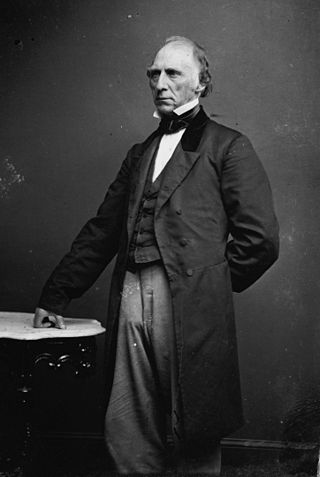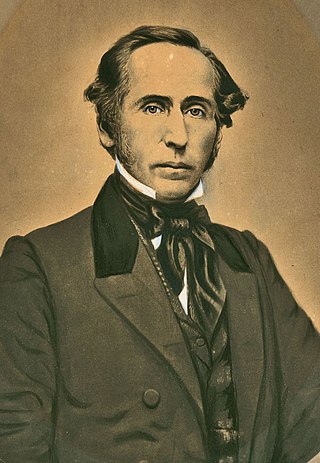
Lot Myrick Morrill was an American politician who served as the 28th governor of Maine, as a United States senator, and as U.S. secretary of the treasury under President Ulysses S. Grant. An advocate for hard currency rather than paper money, Morrill was popularly received as treasury secretary by the American press and Wall Street. He was known for financial and political integrity, and was said to be focused on serving the public good rather than party interests. Morrill was President Grant's fourth and last Secretary of the Treasury.

Anson Peaslee Morrill was an American politician who served as the 24th governor of Maine from 1855 to 1856 and later as the U.S. representative from Maine's 4th congressional district from 1861 to 1863.

The 1996 United States Senate elections were held on November 5, with the 33 seats of Class 2 contested in regular elections. Special elections were also held to fill vacancies. They coincided with the presidential election of the same year, in which Democrat Bill Clinton was re-elected president.

The 1972 United States Senate elections were held on November 7, with the 33 seats of Class 2 contested in regular elections. They coincided with the landslide re-election of Republican President Richard Nixon. Despite Nixon's landslide victory, Democrats increased their majority by two seats. The Democrats picked up open seats in Kentucky and South Dakota, and defeated four incumbent senators: Gordon Allott of Colorado, J. Caleb Boggs of Delaware, Jack Miller of Iowa, and Margaret Chase Smith of Maine. The Republicans picked up open seats in New Mexico, North Carolina, and Oklahoma, and defeated one incumbent, William B. Spong Jr. of Virginia.

The 1966 United States Senate elections were elections on November 8, 1966, for the United States Senate which occurred midway through the second term of President Lyndon B. Johnson. The 33 seats of Class 2 were contested in regular elections. Special elections were also held to fill vacancies. With divisions in the Democratic base over the Vietnam War, and with the traditional mid-term advantage of the party not holding the presidency, the Republicans took three Democratic seats, thereby breaking Democrats' 2/3rds supermajority. Despite Republican gains, the balance remained overwhelmingly in favor of the Democrats, who retained a 64–36 majority. Democrats were further reduced to 63–37, following the death of Robert F. Kennedy in June 1968.

United States gubernatorial elections were held on November 7, 2006, in 36 states and two territories. The elections coincided with the midterm elections of the United States Senate and the United States House of Representatives.

The 2006 Pennsylvania gubernatorial election was held on November 7, 2006 and included the races for the Governor of Pennsylvania and Lieutenant Governor of Pennsylvania. Incumbent Democratic Governor Ed Rendell successfully ran for re-election. Pennsylvania's first female lieutenant governor, Catherine Baker Knoll, was also running for re-election.

United States gubernatorial elections were held on November 5, 2002, in 36 states and two territories. The Republicans won eight seats previously held by the Democrats, as well as the seat previously held by Minnesota governor Jesse Ventura, who was elected on the Reform Party ticket but had since renounced his party affiliation. The Democrats won 10 seats previously held by the Republicans, as well as the seat previously held by Maine governor Angus King, an independent. The elections were held concurrently with the other United States elections of 2002.
The following table indicates the party of elected officials in the U.S. state of Maine:

The 2014 United States Senate elections were held on November 4, 2014. A total of 36 seats in the 100-member U.S. Senate were contested. Thirty-three Class 2 seats were contested for regular six-year terms to be served from January 3, 2015, to January 3, 2021, and three Class 3 seats were contested in special elections due to Senate vacancies. The elections marked 100 years of direct elections of U.S. senators. Going into the elections, 21 of the contested seats were held by the Democratic Party, while 15 were held by the Republican Party.

The 1970 Maine gubernatorial election took place on November 3, 1970. Incumbent Democratic Governor of Maine Kenneth M. Curtis chose to seek re-election. Curtis won a landslide victory in the Democratic primary. His general election opponent was Maine Attorney General James Erwin, the Republican nominee. Erwin had also easily won his respective party primary and received the Republican nomination for governor. Curtis narrowly defeated challenger in one of the tightest elections in Maine history – the final margin of victory was a mere 890 votes. Curtis received 163,138 votes (50.14%), while Erwin had 162,248 votes (49.86%).

The 1862–63 United States Senate elections were held on various dates in various states, occurring during the American Civil War. As these U.S. Senate elections were prior to the ratification of the Seventeenth Amendment in 1913, senators were chosen by state legislatures. Senators were elected over a wide range of time throughout 1862 and 1863, and a seat may have been filled months late or remained vacant due to legislative deadlock. In these elections, terms were up for the senators in Class 1.

The 2018 United States Senate elections were held on November 6, 2018. Among the 100 seats, the 33 of Class 1 were contested in regular elections while 2 others were contested in special elections due to Senate vacancies in Minnesota and Mississippi. The regular election winners were elected to 6-year terms running from January 3, 2019, to January 3, 2025. Senate Democrats had 26 seats up for election, while Senate Republicans had 9 seats up for election.

United States gubernatorial elections were held on November 8, 2022, in 36 states and three territories. As most governors serve four-year terms, the last regular gubernatorial elections for all but two of the seats took place in the 2018 U.S. gubernatorial elections. The gubernatorial elections took place concurrently with several other federal, state, and local elections, as part of the 2022 midterm elections.

The 2024 United States elections are scheduled to be held on Tuesday, November 5, 2024. During this presidential election year, the president and vice president will be elected. In addition, all 435 seats in the United States House of Representatives and 34 of the 100 seats in the United States Senate will be contested to determine the membership of the 119th United States Congress. Thirteen state and territorial governorships and numerous other state and local elections will also be contested.

A general election was held in the U.S. state of Wyoming on Tuesday, November 3, 1942. All of the state's executive officers—the governor, secretary of state, auditor, treasurer, and superintendent of public instruction—were up for election. Like the 1938 elections, this year's elections were something of a mixed bag for both parties. Democratic secretary of state Lester C. Hunt successfully defeated Republican governor Nels H. Smith for re-election, but Republicans flipped the secretary of state's office in Hunt's absence. The other incumbents—State Auditor William M. Jack, a Democrat, and Superintendent Esther L. Anderson, a Republican—were re-elected, and Republicans held onto the state treasurer's office.

The 1853 Maine gubernatorial election was held on 12 September 1853 in order to elect the Governor of Maine. Incumbent Whig Governor William G. Crosby defeated Democratic nominee Albert Pillsbury, Anti-Maine Law nominee Anson Morrill and Free Soil Party nominee and former member of the Maine Senate Ezekiel Holmes. However, as no candidate received a majority of the total votes cast as was required by Maine law, the election was forwarded to the Maine legislature, who chose Crosby as governor, despite the fact he only came in second in the popular vote.

The 1855 Maine gubernatorial election was held on 10 September 1855 in order to elect the Governor of Maine. Democratic nominee and former member of the Maine House of Representatives Samuel Wells defeated incumbent Republican Governor Anson Morrill and Whig nominee and former member of the U.S. House of Representatives from Maine's 4th district Isaac Reed. However, as no candidate received a majority of the total votes cast as was required by Maine law, the election was forwarded to the Maine legislature, who chose Wells as governor, despite the fact he only came in second in the popular vote.

The 1857 Maine gubernatorial election was held on 14 September 1857 in order to elect the Governor of Maine. Republican nominee Lot M. Morrill defeated Democratic nominee Manassah H. Smith.

The 1859 Maine gubernatorial election was held on 12 September 1859 in order to elect the Governor of Maine. Incumbent Republican Governor Lot M. Morrill won re-election against Democratic nominee Manassah H. Smith in a second rematch of the previous elections.



















